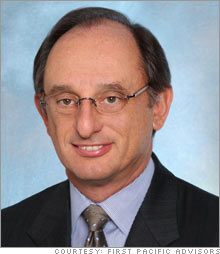Steering clear of the mortgage messOne top fund manager is slashing his financial services stake and building up cash.NEW YORK (Money) -- Don't expect a quick recovery from the subprime mortgage debacle. That's the view of well-known value investor Robert Rodriguez. A rare switch-hitter in the fund industry, he runs both a stock and bond fund: FPA New Income, a $1.8 billion fixed-income fund (one of Money's 70 recommended funds) and $2.2 billion FPA Capital, a small value fund (currently closed to new investors), which both have solid long-term records.
Rodriguez is a contrarian who buys issues that are out of favor on Wall Street, and he keeps a sharp eye on risk. When he cannot find compelling bargain, or when he sees economic problems mounting, he lets cash build up in his portfolios. Recently, cash made up a hefty 40 percent of assets in both FPA Capital (FPPTX (Charts) and FPA New Income (FPNIX (Charts). "We see significant risks, so I'm in preservation mode," said Rodriguez. Topping Rodriguez's list of worries is the collapse of the subprime mortgage market, where he first saw problems emerging two years ago. "Starting in 2004, it's has been one of the worst mortgage underwriting cycles that I've seen in my career," says Rodriguez. "Lending standards deteriorated as more and more groups got access to credit even though they didn't qualify." Right now, the economic consensus is that the subprime fallout will cause only a temporary economic downturn. It's a view that Rodriguez does not share. "It's still early in the cycle to know how things will turn out. But I think the notion that we won't have a major economic readjustment is really optimistic." So far the biggest fallout has shown up in financial services companies that have packaged and purchased securities backed by subprime mortgages. The damage is also spreading to Alt-A mortgages, which fall between prime and subprime. "Just recently we have seen lenders like M&T Bank (Charts, Fortune 500) and SouthStar Funding hit by difficulties selling their Alt-A loans," Rodriguez says. "As more banks start looking under the hood of these loans, who knows what they'll find?" And he thinks that other financial services companies are only beginning to discover their exposure to these securities. "Credit agencies have rated mortgage-backed securities using models that assume moderate home price appreciation," Rodriguez says. "If we have low-to-mid-single digit appreciation, then the world is safe - this will have a short-lived impact. But what happens if we have zero appreciation, or even price declines? If you ask the credit agencies, they will tell you their models just fall apart." To avoid further damage, Rodriguez cut FPA Capital's stake in the financial services industry, which had been as much as 37 percent of the portfolio, to just 2.4 percent. He also slashed FPA New Income's junk bond holdings to less than 1 percent, an all-time low. "The yields on junk bonds are much too low given the level of risk," he says. And he has moved up in credit quality ladder, with nearly 100 percent of the fund's portfolio in triple-A rated issues, an all time high. Rodriguez's ultra-cautious stance can hurt his returns at times. FPA Capital posted a 5.4 percent gain in 2006, which placed it in the bottom 2 percent of its category. But FPA New Income's 4.8 percent return ranks in the top 20 percent. Over the past 10 years, Capital ranks in the top 37 percent of its category, and New Income is in top 39 percent. "Sometimes I can be too early, but I'm right more often than I'm wrong," says Rodriguez. "And my gut tells me the problems stemming from the subprime mess will be a lot worse than many people expect." |
|

